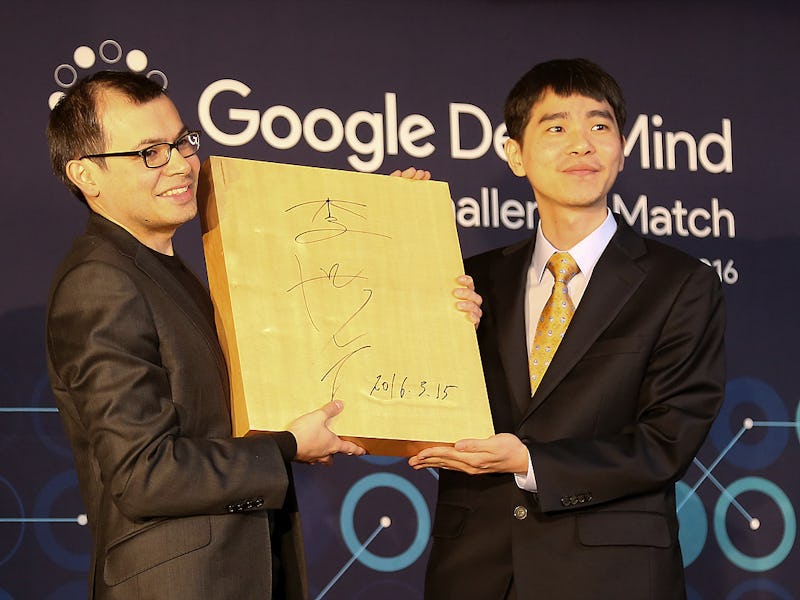Google DeepMind Creator Says "Everyone Was Surprised" A.I. Beat a Human
DeepMind says the public test of AlphaGo was more than just a game.

On Tuesday in Seoul, South Korea, Google’s DeepMind artificial intelligence supercomputer AlphaGo won the final match against the best human Go player in the past decade, Lee Sedol, and finished the five-game competition with a record of 4-1. Both Sedol and the AlphaGo team showed incredible performances throughout the competition.
But for CEO and co-founder of DeepMind, Demis Hassabis, it isn’t just about winning the game of Go — one of the oldest and most challenging board games that exists — but about what the game represents. Today, Hassabis reflected on AlphaGo’s triumph in a Google blog post, declaring he was just as surprised as the rest of the world that AlphaGo beat Sedol four times.
First, Hassabis writes that AlphaGo’s entire performance proves that A.I. has great potential for solving problems beyond making the right moves during a game of Go.
“AlphaGo has the ability to look ‘globally’ across a board — and find solutions that humans either have been trained not to play or would not consider.”
Hassabis could be making a comparison of the board of Go to the world, where the moves during the game are analogous to the actions and policies we make when we face global issues. The DeepMind A.I. project was originally created back in 2010 to assist in global problems such as climate change and disease diagnosis. AlphaGo, in a way, is a testbed to understand the limits and possibilities of A.I. and where DeepMind can take the system next.
The second thing DeepMind realized is that regardless of the winner, AlphaGo is a testament of human creativity and innovation. Hassabis frowned upon the headlines that coined the whole test as a “man vs. machine” competition because whether Sedol won or AlphaGo won, humans would still come out as the champions.
Lee Se-Dol reviews the match after the fourth match against AlphaGo on March 13.
The competition also brought a lot of popularity to DeepMind’s technology — searches for Go rules and boards surged in the United States, tens of millions in China live streamed the matches, and Go boards sales went up in Korea.
However, Hassabis and DeepMind look forward and stay humble:
“But as they say about Go in Korean: ‘Don’t be arrogant when you win or you’ll lose your luck.’ This is just one small, albeit significant, step along the way to making machines smart.”
DeepMind received $1 million for winning the Go competition that it will put towards STEM education organizations, Go, and UNICEF. Next, the company will spend time studying each of the games Sedol and AlphaGo played in detail.
To recap, here’s Inverse’s individual coverage of each match:
AlphaGo defeats the European Go champion on January 27.
AlphaGo wins the first of a five-match run against Sedol.
Elon Musk praises AlphaGo and says its victory is a ten-year jump for A.I.
The second match is also a victory, and AlphaGo leads 2-0.
Sedol wins (!!!) the fourth match.
Before the final match, we reasoned that it’s OK humanity might lose this series of matches.
AlphaGo wasn’t off to a great start on game five, but in the end it won the final match ending the competition 4-1.